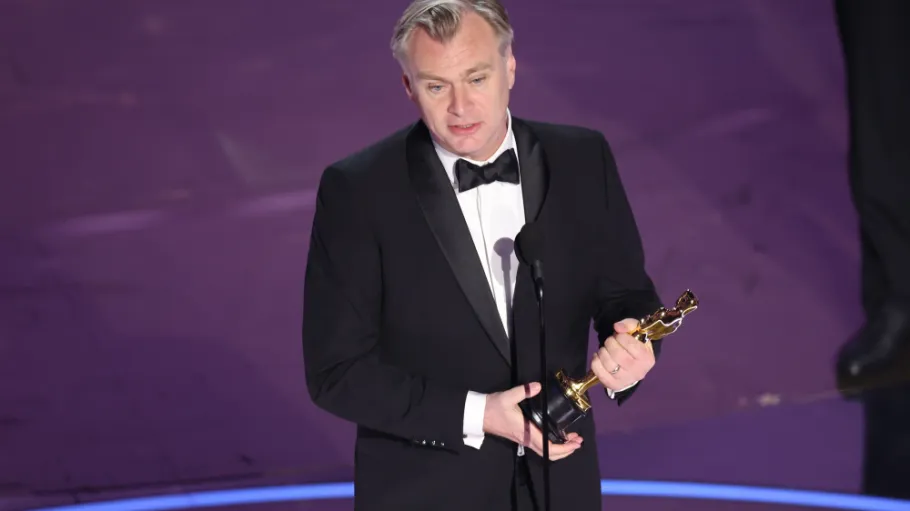Oscar Winners 2024: Oppenheimer Wins Big, See The Full List
Source: Variety

Christopher Nolan’s “Oppenheimer,” an unsettling look at the dawn of the atomic era, dominated the 96th Academy Awards on Sunday, winning seven prizes, including best picture and best director. The film, which took on an added resonance at a time of international conflicts, also scored Oscars for Cillian Murphy’s haunted lead performance as J. Robert Oppenheimer and Robert Downey Jr.’s supporting turn as a vengeful bureaucrat.
“We made a film about the man who created the atomic bomb, and for better or for worse, we’re all living in Oppenheimer’s world,” Murphy noted in his acceptance speech.
And there were tangible reminders of that legacy, as well as of the global tumult that gave Nolan’s historical drama about the creation of the nuclear bomb its jolt of immediacy. Blocks away from the Oscars red carpet, several hundred protesters called for a ceasefire to the Israel-Hamas war in Gaza, while winners used their speeches to decry the humanitarian crisis in that region, along with the one sparked by Russia’s invasion of Ukraine. The pro-Palestinian demonstrations in the heart of Hollywood snarled traffic around the Dolby Theatre, the venue where the show is held, resulting in a late start for the ceremony as A-listers scrambled to make it to their seats.
For Nolan, the honors came after a tangled history with the Oscars. He had been nominated several times before, including for directing 2017’s “Dunkirk,” as well as for his work on movies like 2001’s “Memento” and 2010’s “Inception.” But the Academy snubbed his biggest hit, 2008’s “The Dark Knight,” for best picture and director, an omission that provoked outrage and helped prompt the organization to increase the number of films nominated for best of the year from five to 10. Finally given an Oscar of his own, Nolan, who has been a passionate advocate for the big screen experience, paid tribute to the art form he loves.
“Movies are just a little bit over 100 years old,” he said. And then Nolan added: “We don’t know where this incredible journey is going from here, but to know that you think that I’m a meaningful part of it means the world to me.”
Seven years after winning for “La La Land,” Emma Stone earned her second best actress Oscar for “Poor Things.” Stone played a child-like woman who embarks on a journey of self-discovery in the steampunk fantasy. She thanked her director Yorgos Lanthimos, with whom she has just made another movie, “Kinds of Kindness,” while also reflecting on the collaborative nature of cinema. “The best part about making movies is all of us together,” she said. “I am so deeply honored to share this with every cast member, with every crew member, with every single person who poured their love and their care and their brilliance into the making of this film.”
Stone’s win was one of four victories for “Poor Things,” which also was recognized in several technical and below-the-line categories.
Da’Vine Joy Randolph earned best supporting actress for her role as a grieving cafeteria manager grappling with the death of her son in “The Holdovers.” Tearing up, Randolph thanked voters for “seeing me,” adding, “For so long, I’ve always wanted to be different, and now, I realize, I just need to be myself.”
Like Randolph, Cord Jefferson and Justine Triet won on their first nominations. Jefferson was lauded for adapted screenplay for “American Fiction,” a satire that explores race and art, while Triet won for original screenplay for her courtroom drama “Anatomy of a Fall.”
“Oppenheimer,” with its solemn subject matter, was a change of pace for Downey, who spent the past two decades playing Iron Man in Marvel movies. “Here’s my little secret: I needed this job more than it needed me,” Downey said. The actor, who struggled with drug addiction through the 1990s and early aughts before getting sober and launching his comeback, thanked Tom Hansen, his lawyer of 40 years — “half of which,” Downey joked, “he spent trying to get me insured and bailing me out.”
Other winners used their time on stage to make political statements. Jonathan Glazer, director of the best international feature winner “The Zone of Interest,” a drama set in Auschwitz, spoke out about the ongoing violence in the Middle East. He cited the message of his searing look at the Holocaust in condemning Israel’s military response, as well as the terrorist attacks launched by Hamas last fall.
“Our film shows where dehumanization leads at its worst,” Glazer said. “It shaped all of our past and present. Right now, we stand here as men who refute their Jewishness and the Holocaust being hijacked by an occupation which has led to conflict for so many innocent people. Whether the victims of Oct. 7 in Israel or the ongoing attack on Gaza, all the victims of this dehumanization — how do we resist?”
“20 Days in Mariupol,” a harrowing report from a besieged Ukrainian city, won best documentary. Its director, Mstyslav Chernov, drew attention to the human costs of Russia’s invasion — a message that comes as U.S. support for Ukraine is wavering. “Russians are killing tens of thousands of my fellow Ukrainians,” he said. “I wish I had never made this film. I wish to be able to exchange this to Russia [for] never attacking Ukraine, never occupying our cities.”
Billie Eilish made history, becoming the youngest two-time Oscar recipient at age 22 after winning best song for her “Barbie” ballad “What Was I Made For?” She co-wrote the song with her brother, Finneas O’Connell — the pair previously won for penning the theme to 2021’s “No Time to Die.” On the other end of the age divide, Hayao Miyazaki became the oldest winner of best animated feature for “The Boy and the Heron.” The 83-year-old Japanese animation maestro previously won for 2002’s “Spirited Away.”
This 2024 Academy Awards, honoring the best films of the previous year, arrived at a tumultuous moment for Hollywood, which didn’t have a whole lot to celebrate over those 12 months. The major studios spent much of that time locked in labor disputes with the leading actors and writers unions, a standoff that resulted in two costly strikes that shut down film production. A big part of the debate centered on how the streaming revolution that changed how movies and shows are made and distributed has also disrupted the way that the creative community profits from its work. Striking workers argued that the royalties they earn when their movies appear on Netflix, Prime Video, Apple TV+ or other streamers pales in comparison to what they make from home entertainment platforms and cable licensing and in turn, imperils their livelihoods.
The shift to streaming has been tumultuous in other ways. Hollywood companies in the last five years invested considerably in launching their own in-house challengers to Netflix, debuting services like Disney+, Paramount+, Peacock or Max. However, Wall Street has become increasingly skeptical about the economics of streaming and is concerned that these companies have yet to demonstrate they can be sufficiently profitable. That’s sent the share prices of Disney, Warner Bros. Discovery and other major media companies tumbling, setting off a fresh wave of cutbacks and layoffs.
The Oscars, which have been suffering from declining ratings, also face questions about their relevance. Last year, an audience of 18.75 million tuned in to watch “Everything Everywhere All at Once” sweep the major prizes. That was a bump from the 16.62 million viewers from the 2022 show, but it’s a far cry from the record 57.25 million viewers who witnessed “Titanic” capture best picture in 1998. The hope is that with popular films such as “Oppenheimer” and “Barbie” nominated for top honors, ratings will improve.
Jimmy Kimmel, returning for a fourth round as Oscars host, kicked off the ceremony with jokes about the Academy’s snub of “Barbie” filmmaker Greta Gerwig in the directing category, the excessive lengths of several nominated films (“Oppenheimer” and “Killers of the Flower Moon” breach the three-hour mark) and Robert De Niro’s much younger girlfriend.
He also found the humorous side of the strikes. “We learned a lot while we were out on the picket line,” Kimmel said. “The strike raised questions about our industry, like, if a movie premieres at The Grove and there are no actors there to promote it, does Mario Lopez make a sound?”
Kimmel ended his monologue by calling “the teamsters, the truck drivers, gaffers, grips” to join him on stage, praising them for refusing the cross the picket lines as actors and writers held out for a better contract.
“Come on, guys, take a bow,” Kimmel said. “Take a bow. You deserve it. Thank you for standing with us.”
These workers, many of them members of IATSE, are negotiating their own deal with studios. If talks break down, they could go on strike this summer, leading to another period of production shutdowns and picketing.
Politics interceded in other ways. Towards the end of the three-and-a-half-hour broadcast, Kimmel came on stage to read a review from Donald Trump, the former White House resident and presumptive Republican nominee for president.
“Has there EVER been a WORSE HOST than Jimmy Kimmel at The Oscars?,” Trump wrote on his social media site, Truth Social. “His opening was that of a less than average person trying too hard to be something which he is not, and can never be.”
Kimmel’s response to a critic who has been indicted in four criminal cases was equally scathing. “Isn’t it past your jail time?” he asked. Here’s the complete list of winners:
Best Picture
“American Fiction,” Ben LeClair, Nikos Karamigios, Cord Jefferson and Jermaine Johnson, producers
“Anatomy of a Fall,” Marie-Ange Luciani and David Thion, producers
“Barbie,” David Heyman, Margot Robbie, Tom Ackerley and Robbie Brenner, producers
“The Holdovers,” Mark Johnson, producer
“Killers of the Flower Moon,” Dan Friedkin, Bradley Thomas, Martin Scorsese and Daniel Lupi, producers
“Maestro,” Bradley Cooper, Steven Spielberg, Fred Berner, Amy Durning and Kristie Macosko Krieger, producers
“Oppenheimer,” Emma Thomas, Charles Roven and Christopher Nolan, producers (WINNER)
“Past Lives,” David Hinojosa, Christine Vachon and Pamela Koffler, producers
“Poor Things,” Ed Guiney, Andrew Lowe, Yorgos Lanthimos and Emma Stone, producers
“The Zone of Interest,” James Wilson, producer
Best Director
Justine Triet — “Anatomy of a Fall”
Martin Scorsese — “Killers of the Flower Moon”
Christopher Nolan — “Oppenheimer” (WINNER)
Yorgos Lanthimos — “Poor Things”
Jonathan Glazer — “The Zone of Interest”
Actor in a Leading Role
Bradley Cooper — “Maestro”
Colman Domingo — “Rustin”
Paul Giamatti — “The Holdovers”
Cillian Murphy — “Oppenheimer” (WINNER)
Jeffrey Wright — “American Fiction”
Actress in a Leading Role
Annette Bening — “Nyad”
Lily Gladstone — “Killers of the Flower Moon”
Sandra Hüller — “Anatomy of a Fall”
Carey Mulligan — “Maestro”
Emma Stone — “Poor Things” (WINNER)
Actor in a Supporting Role
Sterling K. Brown — “American Fiction”
Robert De Niro – “Killers of the Flower Moon”
Robert Downey Jr. — “Oppenheimer” (WINNER)
Ryan Gosling — “Barbie”
Mark Ruffalo — “Poor Things”
Actress in a Supporting Role
Emily Blunt — “Oppenheimer”
Danielle Brooks — “The Color Purple”
America Ferrera – “Barbie”
Jodie Foster — “Nyad”
Da’Vine Joy Randolph — “The Holdovers” (WINNER)
Adapted Screenplay
“American Fiction,” written for the screen by Cord Jefferson (WINNER)
“Barbie,” written by Greta Gerwig and Noah Baumbach
“Oppenheimer,” written for the screen by Christopher Nolan
“Poor Things,” screenplay by Tony McNamara
“The Zone of Interest,” written by Jonathan Glazer
Original Screenplay
“Anatomy of a Fall,” screenplay by Justine Triet and Arthur Harari (WINNER)
“The Holdovers,” written by David Hemingson
“Maestro,” written by Bradley Cooper and Josh Singer
“May December,” screenplay by Samy Burch; story by Samy Burch and Alex Mechanik
“Past Lives,” written by Celine Song
Cinematography
“El Conde” – Edward Lachman
“Killers of the Flower Moon” – Rodrigo Prieto
“Maestro” – Matthew Libatique
“Oppenheimer” – Hoyte van Hoytema (WINNER)
“Poor Things” – Robbie Ryan
Original Song
“The Fire Inside” from “Flamin’ Hot,” music and lyric by Diane Warren
“I’m Just Ken” from “Barbie,” music and lyric by Mark Ronson and Andrew Wyatt
“It Never Went Away” from “American Symphony,” music and lyric by Jon Batiste and Dan Wilson
“Wahzhazhe (A Song For My People)” from “Killers of the Flower Moon,” music and lyric by Scott George
“What Was I Made For?” from “Barbie,” music and lyric by Billie Eilish and Finneas O’Connell (WINNER)
Costume Design
“Barbie” – Jacqueline Durran
“Killers of the Flower Moon” – Jacqueline West
“Napoleon” – Janty Yates and Dave Crossman
“Oppenheimer” – Ellen Mirojnick
“Poor Things” – Holly Waddington (WINNER)
Sound
“The Creator,” Ian Voigt, Erik Aadahl, Ethan Van der Ryn, Tom Ozanich and Dean Zupancic
“Maestro,” Steven A. Morrow, Richard King, Jason Ruder, Tom Ozanich and Dean Zupancic
“Mission: Impossible – Dead Reckoning Part One,” Chris Munro, James H. Mather, Chris Burdon and Mark Taylor
“Oppenheimer,” Willie Burton, Richard King, Gary A. Rizzo and Kevin O’Connell
“The Zone of Interest,” Tarn Willers and Johnnie Burn (WINNER)
Original Score
“American Fiction” – Laura Karpman
“Indiana Jones and the Dial of Destiny” John Williams
“Killers of the Flower Moon” – Robbie Robertson
“Oppenheimer” – Ludwig Göransson (WINNER)
“Poor Things” – Jerskin Fendrix
Live Action Short Film
“The After,” Misan Harriman and Nicky Bentham
“Invincible,” Vincent René-Lortie and Samuel Caron
“Knight of Fortune,” Lasse Lyskjær Noer and Christian Norlyk
“Red, White and Blue,” Nazrin Choudhury and Sara McFarlane
“The Wonderful Story of Henry Sugar,” Wes Anderson and Steven Rales (WINNER)
Animated Short Film
“Letter to a Pig,” Tal Kantor and Amit R. Gicelter
“Ninety-Five Senses,” Jerusha Hess and Jared Hess
“Our Uniform,” Yegane Moghaddam
“Pachyderme,” Stéphanie Clément and Marc Rius
“War Is Over! Inspired by the Music of John & Yoko,” Dave Mullins and Brad Booker (WINNER)
Documentary Feature Film
“Bobi Wine: The People’s President,” Moses Bwayo, Christopher Sharp and John Battsek
“The Eternal Memory”
“Four Daughters,” Kaouther Ben Hania and Nadim Cheikhrouha
“To Kill a Tiger,” Nisha Pahuja, Cornelia Principe and David Oppenheim
“20 Days in Mariupol,” Mstyslav Chernov, Michelle Mizner and Raney Aronson-Rath (WINNER)
Documentary Short Film
“The ABCs of Book Banning,” Sheila Nevins and Trish Adlesic
“The Barber of Little Rock,” John Hoffman and Christine Turner
“Island in Between,” S. Leo Chiang and Jean Tsien
“The Last Repair Shop,” Ben Proudfoot and Kris Bowers (WINNER)
“Nǎi Nai & Wài Pó,” Sean Wang and Sam Davis
International Feature Film
“Io Capitano” (Italy)
“Perfect Days” (Japan)
“Society of the Snow” (Spain)
“The Teachers’ Lounge” (Germany)
“The Zone of Interest” (United Kingdom) (WINNER)
Animated Feature Film
“The Boy and the Heron,” Hayao Miyazaki and Toshio Suzuki (WINNER)
“Elemental,” Peter Sohn and Denise Ream
“Nimona,” Nick Bruno, Troy Quane, Karen Ryan and Julie Zackary
“Robot Dreams,” Pablo Berger, Ibon Cormenzana, Ignasi Estapé and Sandra Tapia Díaz
“Spider-Man: Across the Spider-Verse,” Kemp Powers, Justin K. Thompson, Phil Lord, Christopher Miller and Amy Pascal
Makeup and Hairstyling
“Golda,” Karen Hartley Thomas, Suzi Battersby and Ashra Kelly-Blue
“Maestro,” Kazu Hiro, Kay Georgiou and Lori McCoy-Bell
“Oppenheimer,” Luisa Abel
“Poor Things,” Nadia Stacey, Mark Coulier and Josh Weston (WINNER)
“Society of the Snow,” Ana López-Puigcerver, David Martí and Montse Ribé
Production Design
“Barbie,” production design: Sarah Greenwood; set decoration: Katie Spencer
“Killers of the Flower Moon,” production design: Jack Fisk; set decoration: Adam Willis
“Napoleon,” production design: Arthur Max; set decoration: Elli Griff
“Oppenheimer,” production design: Ruth De Jong; set decoration: Claire Kaufman
“Poor Things,” production design: James Price and Shona Heath; set decoration: Zsuzsa Mihalek (WINNER)
Film Editing
“Anatomy of a Fall” – Laurent Sénéchal
“The Holdovers” – Kevin Tent
“Killers of the Flower Moon” – Thelma Schoonmaker
“Oppenheimer” – Jennifer Lame (WINNER)
“Poor Things” – Yorgos Mavropsaridis
Visual Effects
“The Creator,” Jay Cooper, Ian Comley, Andrew Roberts and Neil Corbould
“Godzilla Minus One,” Takashi Yamazaki, Kiyoko Shibuya, Masaki Takahashi and Tatsuji Nojima (WINNER)
“Guardians of the Galaxy Vol. 3,” Stephane Ceretti, Alexis Wajsbrot, Guy Williams and Theo Bialek
“Mission: Impossible – Dead Reckoning Part One,” Alex Wuttke, Simone Coco, Jeff Sutherland and Neil Corbould
“Napoleon,” Charley Henley, Luc-Ewen Martin-Fenouillet, Simone Coco and Neil Corbould
Tags: Hollywood Oscar

![Melissa Barrera and Susan Sarandon [TRT world]](/post-images/009-hollywood.jpg)
![Henry A. Kissinger in 1979 [Neil Leifer/Sports Illustrated, via Getty Images]](/post-images/20231130-kissinger.jpg)
![Professor Abdul Basir, a faculty member in the Department of Islamic History and Culture at DU | Professor Nisar Hossain, Dean of the Faculty of Fine Arts [Image collected]](/post-images/20240822-du.jpg)

![Anjir Liton, former DG of Bangladesh Shishu Academy [Image collected]](/post-images/20240822-shishu-academy.jpg)